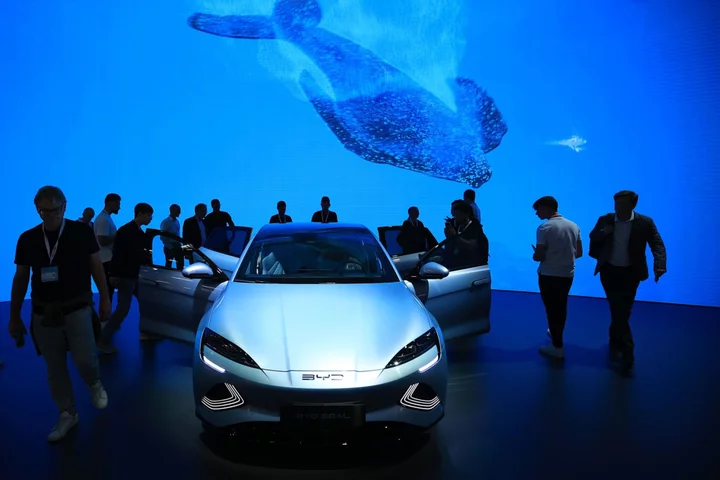(Bloomberg) --
European Union leaders say their investigation into whether Chinese subsidies are giving its companies an unfair advantage in the electric-vehicle market stems from being burned before.
“We have not forgotten how China’s unfair trade practices affected our solar industry,” European Commission President Ursula von der Leyen said when announcing the probe last week. She was referring to how cheaper Chinese solar panels flooded the market in the late 2000s, undercutting many European competitors.
Protectionism is the mantra these days in Europe and the US, so it’s not surprising to see another trade frontier come under scrutiny. The auto industry is responsible for nearly 14 million jobs in the EU, covering about 6% of total employment, according to figures from the European Commission. That may be under threat as China-owned brands have increased their share of the continent’s EV sales to nearly 6% from as little as 1% in 2020.
But the comparison to solar may lead Europe to draw the wrong lessons. While solar and EVs are both green products experiencing soaring demand, China gained leads in each of those technologies quite differently.
The Asian giant began subsidizing solar manufacturing in the early 2000s with the express intent of servicing a growing market for panels in Europe. It was an export-oriented investment which succeeded in crushing European production, including one of its largest makers, the German company Q-Cells. China created its own domestic incentives for solar deployment only after its panels had flooded foreign markets — allowing it to become the world’s largest market for solar in less than a decade.
In contrast, China’s investments in EVs and lithium-ion batteries to power them began with a local focus. China consumed, on average, about one barrel of oil per citizen each year in 2000, whereas US citizens consumed 20 barrels. The Asian economy could never afford an oil import bill of that magnitude, which meant it needed to find an alternative way to power its cars.
At the heart of that push was Wan Gang, an auto engineer who moved back to China from Germany in the early 2000s to begin a secretive research project that would help his country build new-energy vehicles that would not rely on oil. His first major task was to showcase Chinese-built EVs at the 2008 Beijing Olympics. But it wasn’t until 2015 that China began dominating the world in EV manufacturing and only this year will it become the world’s largest car exporter.
Unlike European solar companies that were caught off guard by Chinese competition, the region’s legacy automakers have had nearly two decades to catch up with China, but warnings of their coming dominance largely went unheeded.
“We have a massive competitiveness problem,” said Roberto Vavassori, who heads Italy’s automotive industry association Anfia. Vavassori welcomed the EU probe but admitted that it won’t be enough. Trade barriers alone did not revitalize Europe’s solar manufacturing and are unlikely to save its automakers.
While restrictions might have a bigger impact on EV imports than they did on solar panels, it will be challenging for European regulators to draw a clear line between Chinese state support and cheaper vehicles, says Siyi Mi, BloombergNEF’s transport analyst.
China has discontinued much of its consumer subsidies for EVs, leaving other kinds of subsidies, which Mi said are much harder to trace. The probe may go on for a year, during which Chinese competitiveness is likely to only strengthen even without the level of government support that fueled the industry’s growth in the previous decade.
However, if European policymakers do decide to put barriers in place, they could be more effective than restrictions against solar imports. In that case, Chinese companies simply shifted simpler parts of the supply chain, such as assembling modules, to Southeast Asian countries while maintaining their dominance of the global solar market. But cars need thousands of parts and moving assembly to another country will be much more expensive and will take longer.
The EU’s fears may also be overstated, according to Mi. Whether solar panels are made by a German brand or a Chinese brand matter little to the consumer. That’s not the case with car brands, which command much higher loyalty. “Regional brands make up the majority in most big auto markets,” she said.
Akshat Rathi writes the Zero newsletter, which examines the world’s race to cut emissions. You can email him with feedback. His book Climate Capitalism, which explores China’s EV experiments over the last two decades, will be published later this year.

